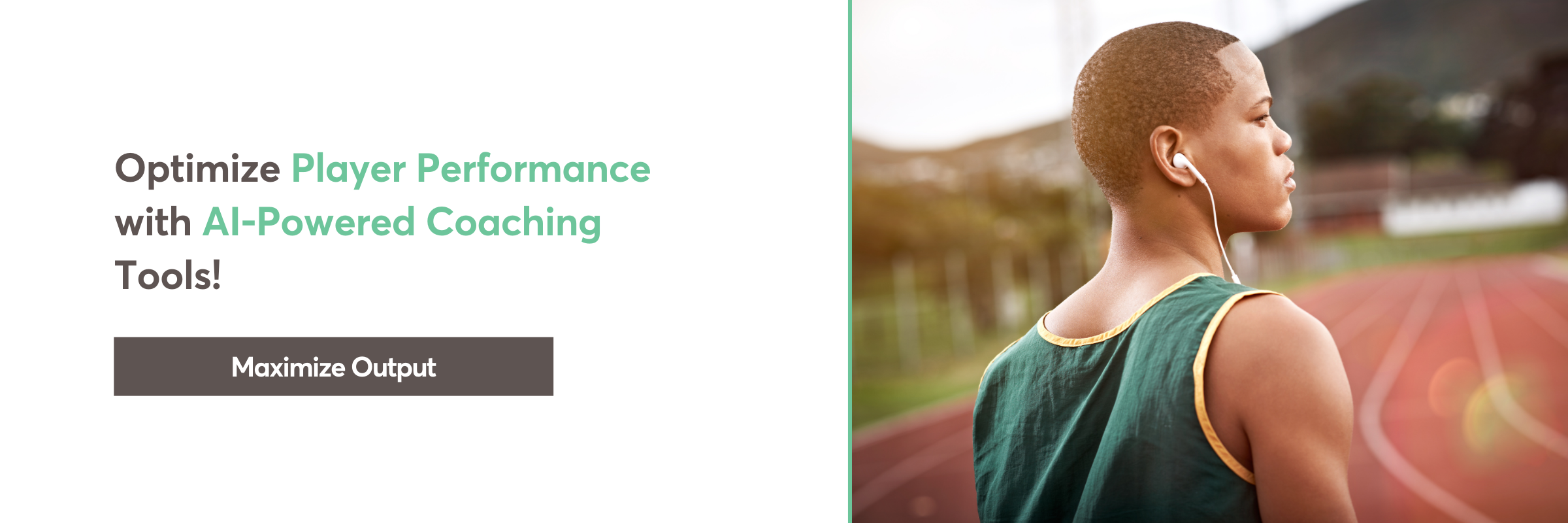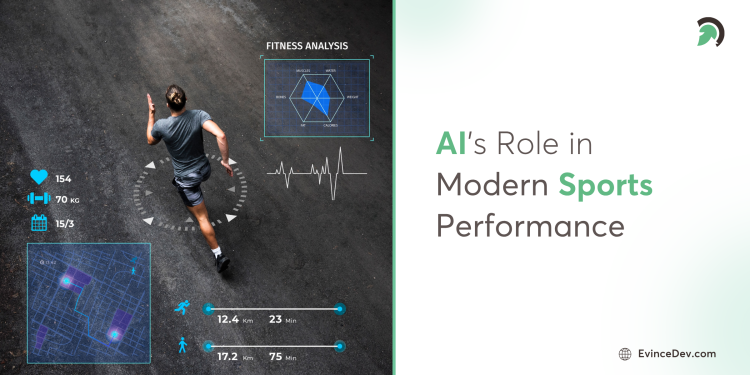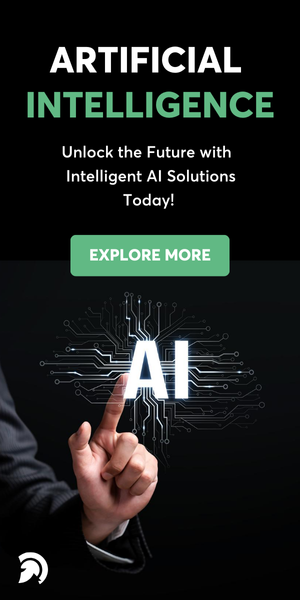Artificial Intelligence (AI) is reshaping industries worldwide, and the sports industry is no exception. Integrating AI in sports creates new opportunities for teams, athletes, coaches, and fans. From data analysis to improving fan engagement, AI transforms how sports are played, managed, and experienced.
In this blog, we’ll explore the impact of AI in sports, how it is changing the landscape, and what the future holds. Let’s dive into the fascinating intersection of sports and AI technology.
- Market size of the sports analytics industry worldwide in 2022, with a forecast for 2031.
- Artificial Intelligence (AI) Market worth $1,339.1 billion by 2030.
Role of AI in Sports Performance
At its core, AI in sports is about optimizing performance on and off the field. One of the most impactful areas where AI makes a difference is in athlete performance analysis. AI-powered tools can track and analyze player movements, providing coaches with valuable insights. It helps athletes improve their technique and avoid injuries.
Key Benefits of AI in Sports Performance:
- Real-time Data Analytics: AI can track players’ performance in real-time, providing immediate feedback.
- Injury Prevention: By analyzing patterns in movement, AI can identify potential injury risks before they happen.
- Training Customization: AI tools tailor training programs based on individual athlete data, helping improve overall performance.

AI in sports doesn’t just focus on the athletes. AI tools also improve how teams manage strategy, helping coaches make more intelligent decisions based on data-driven insights. AI development solutions allow teams to stay ahead of the competition by understanding and exploiting weaknesses in opponents’ strategies.
AI and Fan Engagement
AI isn’t just helping players and coaches—it’s also enhancing the fan experience. With AI, fans can engage with their favorite sports in ways that were previously unimaginable. AI-driven technologies, such as chatbots and personalized content, provide fans with tailored experiences, whether watching the game from home or attending it live.
How AI Enhances Fan Engagement:
- Personalized Content: AI algorithms analyze fan behavior and provide tailored content, including game highlights, statistics, and news.
- Chatbots for Customer Service: AI-powered chatbots can handle ticket inquiries and merchandise orders and even engage with fans through trivia or live commentary.
- Augmented Reality (AR) and Virtual Reality (VR): AI drives AR and VR in sports, creating immersive experiences for fans. Imagine watching a live game from the perspective of your favorite player; thanks to AI, it is now possible.
For sports organizations, these AI business ideas offer a way to deepen their connection with fans and boost revenue through targeted marketing and merchandise sales. As a result, sports teams are increasingly turning to ai app development solution to build cutting-edge platforms that enhance fan engagement.
AI and Sports Analytics
Data analytics has always been a part of sports, but AI is taking it to the next level. AI systems can process massive amounts of data, identifying patterns and trends humans would miss. From individual player statistics to team dynamics, AI provides insights that change how sports organizations operate.
Examples of AI in Sports Analytics:
- Predictive Modeling: AI models can predict outcomes, such as which team will likely win or how individual players will perform based on historical data.
- Advanced Scouting: AI in sports analyzes opponents, helping teams prepare more effectively for upcoming matches.
- Recruitment and Talent Scouting: AI tools analyze player performance data from leagues worldwide, helping teams discover emerging talent.
With AI analytics, teams can make informed decisions about strategy, training, and player acquisitions, giving them a competitive edge. Sports franchises and leagues increasingly turn to AI app development company services to create advanced analytics platforms that help teams stay ahead in a highly competitive environment.
AI in Sports Broadcasting
Broadcasting is another area where AI in sports is making a mark. AI-powered tools improve sports broadcasting by automating video production, providing instant replays, and generating commentary.
Key Developments in AI-Powered Sports Broadcasting:
- Automated Camera Systems: AI can control cameras to capture the best angles without human intervention.
- Instant Replays and Highlights: AI algorithms automatically generate game highlights and replays, making them available to broadcasters and fans in real time.
- Enhanced Commentary: AI-driven tools can analyze game data and provide insightful and accurate commentary.
These AI business ideas for broadcasters represent cost-effective solutions that enhance their sports programming quality. As technology continues to evolve, the role of AI in sports broadcasting will only increase, making games more engaging and accessible to a broader audience.
AI in Sports Betting
Sports betting has always relied on data, but AI transforms the industry by providing bettors with more accurate predictions and insights. AI-powered algorithms can analyze data at a previously impossible level, giving bettors a better chance of making informed decisions.
How AI is Revolutionizing Sports Betting:
- Predictive Analytics: AI models can accurately forecast game outcomes, helping bettors make smarter wagers.
- Real-time Odds Adjustments: AI systems can instantly adjust betting odds based on real-time game data, providing a more dynamic and engaging betting experience.
- Personalized Betting Experiences: AI in sports betting tailors offer promotions to individual bettors based on their betting history and preferences.
These developments are leading to a surge in demand for sports app development company services to create platforms incorporating AI-powered betting tools. As more bettors turn to AI-driven solutions, the sports betting industry will continue to evolve and be driven by innovation.
AI in Talent Identification and Acquisition
AI is becoming a vital tool in talent scouting. With AI-powered analytics, teams can assess player performance from across the globe. AI algorithms can process vast amounts of player data to identify emerging talent that traditional methods might have overlooked.
Benefits of Talent Identification
- Performance Trend Analysis: AI systems analyze player stats, behavior, and performance trends.
- Efficient Talent Scouting: Scouts can focus on the most promising prospects, saving time and resources.
- Future Success Prediction: Advanced modeling helps predict an athlete’s potential for success.
AI in Training and Coaching
AI’s role in sports extends beyond performance analysis and shapes training programs. Coaches can use AI tools to design and implement personalized training regimens for athletes based on data-driven insights, resulting in more effective and tailored training routines.
AI in Training Benefits
- Physical Condition Monitoring: AI monitors athletes’ physical condition and performance trends.
- Customized Training Plans: AI suggests customized drills, exercise plans, and schedules to maximize output.
- Technique Visualization: Video analysis and simulation offer athletes visual cues on their techniques and tactics.
It enhances an athlete’s ability to grow and perform optimally.
AI in Injury Prevention
AI’s capability to process player movement data is a key tool in injury prevention. By analyzing athletes’ biomechanics, AI can spot potential injury risks long before they happen.
Injury Prevention Benefits
- Early Strain Detection: AI analyzes training and game-time data to detect early signs of strain.
- Personalized Recovery Plans: Customized rest and recovery plans can be developed to reduce injury risks.
- Data-Driven Fitness Decisions: Coaches and medical teams can make data-backed decisions on player fitness.
Future of AI in Sports
As AI continues to evolve, integrating it with custom software development will allow organizations to create innovative solutions for analytics, fan engagement, and performance optimization. However, as with any technology, there are challenges to address, such as data privacy concerns and the ethical use of AI in decision-making.
Virtual Coaching and Training
AI will enable real-time, remote coaching sessions for athletes worldwide. It allows coaches to provide personalized training insights based on performance data. Athletes can receive immediate feedback and adjustments, enhancing their development. With AI tools, coaches can track each athlete’s progress and adapt training regimens accordingly. It ensures optimal performance enhancement and skill growth, regardless of geographical limitations. With the support of AI, athletes can train more effectively and improve their skills.

Augmented Reality Experiences
Integrating augmented reality (AR) will transform how fans engage with sports. AR applications will offer immersive experiences during live games. Fans can enjoy enhanced interactions like real-time statistics overlays and unique player perspectives. These technologies create a more engaging way to experience your favorite sports. AR can deepen the connection between fans and the game by providing detailed visual insights. It will elevate overall spectator enjoyment and make each game unforgettable for attendees.
AI-Enhanced Refereeing
AI will significantly improve the accuracy of refereeing decisions in sports. By providing real-time data analysis, AI can assist referees during games. Enhanced video review systems will help minimize human errors and offer objective insights. It ensures fair play and maintains the integrity of the game. With AI’s assistance, coaches and players can trust that officiating will be more reliable. As a result, sports organizations will foster a fairer competitive environment for all teams.
Predictive Analytics
Predictive analytics will become essential for teams seeking strategic advantages. It will allow organizations to forecast player performance and game outcomes accurately. By analyzing extensive historical data and current trends, AI provides valuable insights for decision-making. Coaches can make informed choices about recruitment, training, and game strategies. Teams can optimize their tactics based on predictive models, enhancing their competitiveness. Ultimately, predictive analytics will shape the future of sports strategies and outcomes.
Injury Recovery Optimization
AI will revolutionize the way athletes approach recovery processes after injuries. By analyzing performance data and identifying injury patterns, AI can recommend tailored rehabilitation programs. This will speed up recovery while ensuring athletes return safely to their sport. Medical teams can utilize data-driven insights to monitor recovery progress effectively. AI’s predictive capabilities will help athletes avoid re-injury, optimizing their long-term performance. It will significantly impact athlete’ health and longevity in their careers.
Embracing AI for a Competitive Edge in Sports
As AI transforms the sports industry, organizations, teams, and businesses adopting these innovations will gain a competitive edge. AI’s potential is vast, from enhancing performance and optimizing strategies to revolutionizing fan experiences.
If you’re ready to explore how AI can elevate your sports business, EvinceDev offers expert AI app development services tailored to your needs. Our solutions can help you harness the power of AI to stay ahead in this rapidly evolving industry. Reach out today and take the first step toward innovation.




